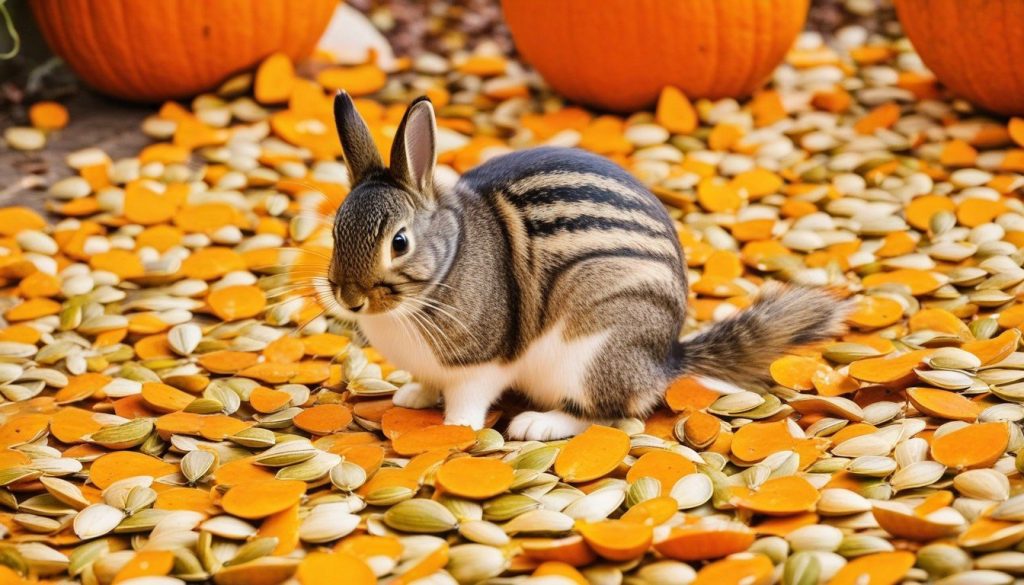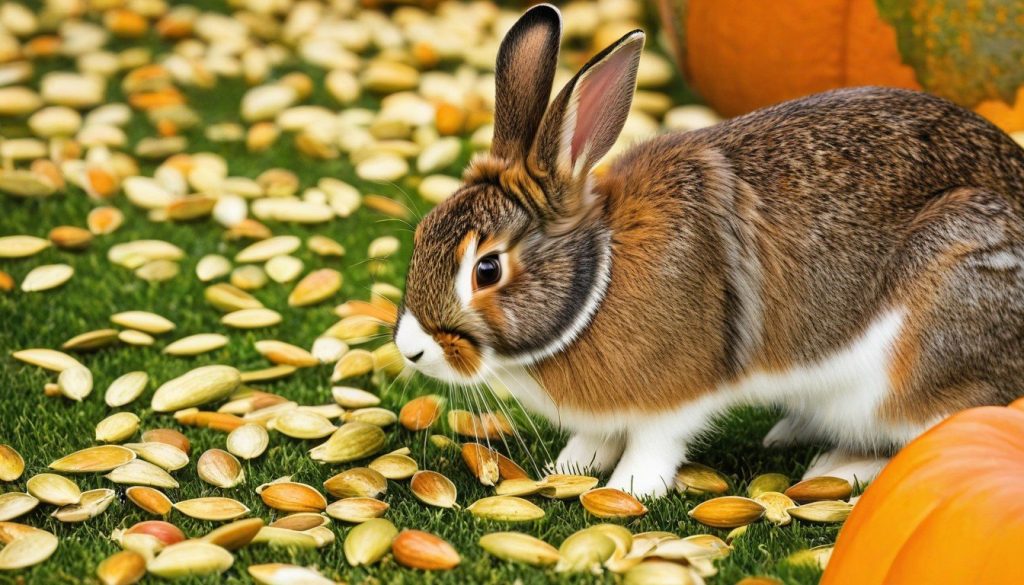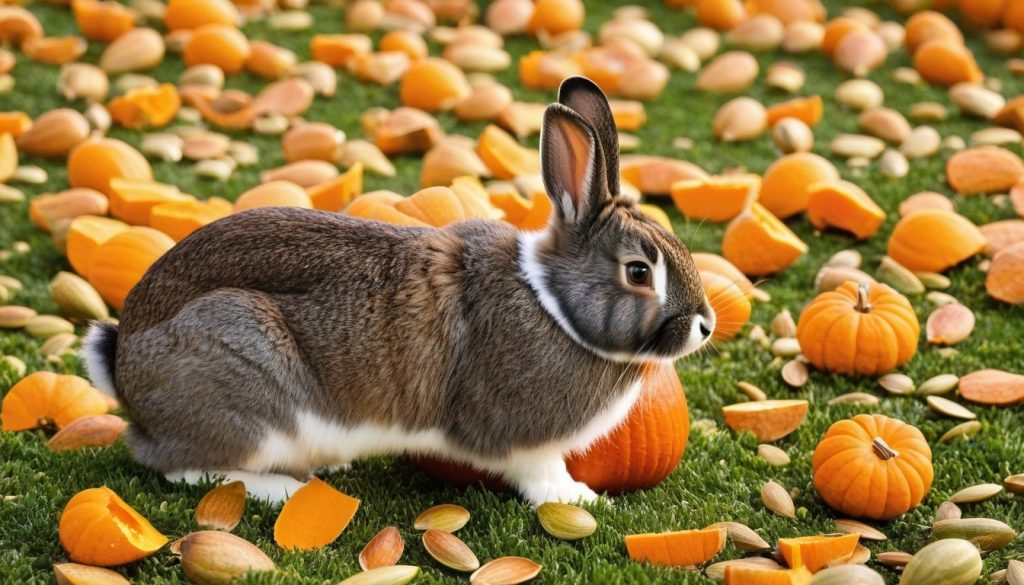Are you a rabbit owner wondering, “Can rabbits eat pumpkin seeds?” Well, the short answer is yes! Pumpkins are not only a delicious fall treat for humans but can also provide some health benefits for our furry friends.
Scientifically classified as a fruit from the winter squash family, pumpkins are rich in nutrients like vitamin A, potassium, and fibre, making them a safe and nutritious addition to your rabbit’s diet. However, knowing the safety facts and proper serving sizes is important to ensure your bunny’s well-being.
In this blog post, we’ll explore “Can Rabbits Eat Raw Pumpkin Seeds And Guts?” the health benefits of pumpkin seeds for rabbits and Safety Facts.
So, let’s dive in and learn all about pumpkin seeds and our fluffy companions!
Can rabbits eat pumpkin seeds?
While rabbits can eat pumpkin flesh, the question is, can rabbits eat pumpkin seeds? Although these seeds are edible for rabbits, they are not highly recommended. Pumpkin seeds contain high fats that can be hard for rabbits to digest. Eating too many seeds could lead to digestive issues like bloating, gas, and obesity.
In addition, the hard outer shell of pumpkin seeds could be a choking hazard for your rabbit. Even though some rabbit owners believe that crushed or cooked pumpkin seeds could help in deworming, there isn’t enough scientific evidence to back this claim. Therefore, sticking to safer and more appropriate food options for your rabbit’s diet is advisable.
While an occasional seed might not cause harm, feeding your rabbit a steady diet of pumpkin seeds is not advised. As a responsible pet owner, it’s always best to consult your vet before introducing new food into your rabbit’s diet.

Potential Health Benefits of Pumpkin for Rabbits
Pumpkins are packed with nutrients that rabbits can benefit from. They are an excellent source of Vitamin A, vital for eye health and immune function.
Extra Hydration:
One of the lesser-known perks of pumpkins is their high water content. At around 90% water, these vibrant fruits supplement your rabbit’s hydration, especially during warmer months.
Rabbits are prone to dehydration, and adding moisture-rich foods to their diet can aid in maintaining optimal hydration levels. Feeding your bunny a slice of fresh pumpkin flesh, with the seeds and stem removed, can provide that additional water source, keeping your furry friend hydrated and happy.
Remember, while pumpkins can help support hydration, they should never replace fresh, clean water. Always ensure your rabbit has constant access to a water source. Pumpkins can contribute to balanced hydration and overall rabbit health when used as a supplement. Isn’t that a refreshing fact to know?
Supports Clear Eyesight:
Pumpkins are a delight to the taste buds and a boon to the eyes. They are brimming with Vitamin A, an essential nutrient known for promoting clear and healthy eyesight. Rabbits, like humans, can’t produce Vitamin A on their own and need to source it from their diet. Including a moderate amount of pumpkin in your bunny’s meals can provide this much-needed nutrient.
Vitamin A helps protect the cornea and the surface of the eye, ensuring your furry friend’s eyes remain bright and clear. Plus, it’s known to aid in night vision – pretty important for a creature that’s most active at dawn and dusk. However, like with anything else, moderation is key. Too much Vitamin A can lead to toxicity, so it’s always best to consult your vet about appropriate serving sizes.
So the next time you serve your bunny a slice of pumpkin, you can feel good knowing you’re contributing to their ocular health!
Maintains Good Bone Health:
Aside from promoting clear eyesight and hydration, pumpkins also support your rabbit’s bone health. They are a significant source of potassium, a mineral essential in maintaining strong and healthy bones.
Rabbits, being active creatures, require a diet rich in nutrients that can help sustain their high-energy lifestyle and keep their bones strong. Introducing a small portion of pumpkin into your rabbit’s diet provides them with this necessary mineral, potentially helping to prevent skeletal issues.
It’s important to note, however, that while pumpkin can be a beneficial supplement, it should not be your bunny’s primary source of nutrition. Moderation is always key, and any dietary changes should be discussed with your vet. So next time you’re carving a pumpkin, consider saving a small piece for your rabbit’s mealtime – you’ll be contributing to their overall health and well-being, bone health included!
Boosts the Immune System:
Pumpkins are truly a powerhouse of nutrients, and one of their notable benefits is boosting the immune system. Pumpkins are chock-full of Vitamin C, an antioxidant known for its immunity-enhancing properties. While rabbits naturally produce Vitamin C, extra diet sources can help strengthen the system.
A robust immune system can help your furry friend stave off various illnesses and infections, keeping them hale and hearty. Moreover, the fibre in pumpkins supports gut health, integral to a strong immune system as a significant portion of the immune response is located in the gut. Introducing moderate amounts of pumpkin into your rabbit’s diet could help boost their immune system.
However, remember, as with any new food, it’s essential to introduce it gradually and monitor your rabbit for any adverse reactions. As always, consult your vet before making any significant dietary changes. So, while you’re enjoying your pumpkin spice latte this fall, know that your furry friend can also enjoy the immune-boosting benefits of this versatile fruit!

Types of Pumpkins to Feed Your Rabbit
When choosing pumpkins for your rabbit, the type of pumpkin matters. Here are the types you should consider:
- Sugar Pumpkins: Also known as pie pumpkins, these are the sweetest variety and are perfect for your bunny. They’re smaller, easier to manage, and packed with nutrients.
- Cinderella Pumpkins: This is an heirloom variety, identified by its vivid orange colour and flattened shape. They’re a good source of nutrition, but their larger size may be more than your bunny can handle.
- Baby Pam Pumpkins: A smaller variety, these are easy to cut into bite-sized pieces for your bunny and have a sweet, smooth flesh that’s easy to digest.
- Ghost Pumpkins: These are white pumpkins, equally safe and beneficial for your rabbit. They add a fun variety to your pet’s diet. Avoid decorative, painted, or artificial pumpkins containing harmful substances. Always opt for fresh, raw pumpkins over canned or processed varieties.
Remember, no matter the type of pumpkin, always remove the seeds and stem before feeding to your bunny. Each pumpkin type can offer a new taste experience for your rabbit; remember to introduce them gradually and monitor their response.
Safety Facts
When considering incorporating pumpkin into your rabbit’s diet, there are a few important safety facts you should bear in mind to ensure a healthy and balanced diet for your bunny:
- Moderation is Key: Just like any other food, pumpkin should be given to rabbits in moderation. Although pumpkins contain beneficial nutrients, they should only make up a small part of your rabbit’s diet.
- Remove the Seeds: Pumpkin seeds can be hard for rabbits to digest and may pose a choking hazard. Always remove the seeds before feeding the pumpkin to your rabbit.
- Avoid Canned Pumpkin: Stick to fresh, raw pumpkin. Canned pumpkins often contain added sugars and spices that can harm your rabbit’s digestive system.
- Not All Parts Are Safe: Never feed your rabbit the stem or leaves of the pumpkin. These parts can be toxic to rabbits.
- Always Wash Before Serving: Make sure to thoroughly wash the pumpkin before feeding it to your rabbit to remove any pesticides or chemicals on the skin.
- Gradual Introduction: Introduce pumpkin slowly into your rabbit’s diet. Sudden changes can cause digestive upset. Start with small pieces and gradually increase the size if your rabbit is enjoying it and not experiencing any digestive issues.
- Consult with Your Vet: If you need clarification on whether or not to feed your rabbit pumpkin or how much to feed them, always consult your vet. They can provide guidance based on your individual rabbit’s health and nutritional needs.
Other Safe Alternatives to Pumpkin Seeds for Rabbits
If you’re searching for safer alternatives to pumpkin seeds for your rabbit, consider the following options:
- Leafy Greens: This is the heart of a rabbit’s diet. Fresh, organic greens like romaine lettuce, kale, or parsley are packed with fibre and essential nutrients.
- Fresh Fruit: Fruits such as apples, pears, or berries can be given as a small treat, but remember to remove any seeds first.
- Vegetables: Fresh, raw vegetables like carrots, bell peppers, or broccoli are a healthy choice, but they should be introduced gradually to prevent digestive upset.
- Rabbit Pellets: These are a convenient source of balanced nutrition, but they should be given sparingly to prevent obesity and dental issues.
Remember, it’s important to provide a balanced diet and consult your vet before introducing any new food into your rabbit’s diet.

How to Feed Pumpkin to Your Rabbits
Feeding pumpkin to your rabbits can be a delightful treat if done correctly. Begin by choosing a ripe pumpkin that’s fresh and free from any blemishes or mould.
Once you’ve selected the perfect pumpkin, thoroughly wash it to remove any potential pesticides or chemicals. When it’s feeding time, cut a small piece of pumpkin flesh for your bunny – remember to remove the seeds and stem, as these can be difficult to digest and may pose a choking hazard. Cut the pumpkin into bite-sized pieces to make it easier for your rabbit to eat.
Slowly introduce new foods, like pumpkin, into your rabbit’s diet. Start by offering a small amount and monitor your rabbit for any changes in behaviour or bowel movements. If there are no issues, you can gradually increase the pumpkin you feed them.
Remember, while pumpkin is nutritious, it should never replace the primary elements of your rabbit’s diet: hay, fresh vegetables, and a small amount of high-quality rabbit pellets. If you have any doubts or concerns, always consult with your vet. Happy pumpkin feeding!
Can Rabbits Eat Pumpkin Leaves, Seeds, Stems and Flowers?
Rabbits can safely eat pumpkin leaves, stems, and flowers! These parts of the pumpkin plant are safe for rabbits and offer valuable nutrients. Pumpkin leaves are rich in fibre, vitamins (like A and K), and minerals (such as calcium and iron), all contributing to a rabbit’s well-being.
However, it’s important to introduce new foods gradually into a rabbit’s diet to avoid digestive issues. Start by offering small amounts of pumpkin leaves, stems, or flowers and observe how your rabbit responds. If there are no adverse effects, you can gradually increase the quantity.
Ensure the pumpkin plant hasn’t been treated with pesticides or chemicals that could harm your rabbit. Always thoroughly wash the leaves, stems, and flowers before feeding them to your pet to remove any potential residues.
Remember, while pumpkin leaves, stems, and flowers are safe, the pumpkin fruit and seeds are also suitable for rabbits in moderation. Pumpkins provide hydration, fibre, and various nutrients, making them a healthy occasional treat.
Consulting a veterinarian for advice on a well-balanced diet for your rabbit, including suitable fresh vegetables and greens, is always a good idea to ensure optimal health.
How Much Pumpkin Should I Feed My Rabbit?
The appropriate amount of pumpkin to feed your rabbit can vary depending on their size, age, and overall health. However, a general rule of thumb is to use pumpkin as an occasional treat rather than a regular part of your bunny’s diet. Consider offering your rabbit a spoonful-sized piece of pumpkin once or twice a week.
This can provide some beneficial nutrients without risking overfeeding. It’s crucial to monitor your bunny after feeding the pumpkin, watching for any changes in their behaviour, eating habits, or bowel movements. If your rabbit shows any signs of discomfort or distress, discontinue feeding them pumpkin and consult your vet.
Remember, the key to a healthy rabbit diet is variety and balance, and while pumpkin can provide some health benefits, it should not replace the staple elements of your rabbit’s diet. Your bunny will appreciate the tasty pumpkin treat, and you’ll feel good knowing you’re supporting their health.
FAQs
Can rabbits eat pumpkin seeds?
While rabbits can technically eat pumpkin seeds, it is not recommended due to their high-fat content and potential choking hazard.
How often can I feed pumpkin to my rabbit?
Pumpkin should be offered as an occasional treat in small amounts, perhaps once or twice a week.
What parts of the pumpkin are safe for my rabbit?
The flesh of the pumpkin is safe for rabbits. However, the seeds, stems, and leaves should be avoided.
Can pumpkin seeds help deworm my rabbit?
While some believe that pumpkin seeds can help deworm rabbits, there isn’t enough scientific evidence to back this claim.
Can my rabbit eat canned pumpkin?
No, canned pumpkins often contain added sugars and spices that can harm your rabbit’s digestive system. Always opt for fresh, raw pumpkin.
Are there other safer alternatives to pumpkin seeds?
Yes, leafy greens, fresh fruits, and vegetables are all excellent alternatives to pumpkin seeds for your rabbit.
Can rabbits eat pumpkin seeds Daily?
Feeding rabbits pumpkin seeds daily isn’t recommended due to their high-fat content. Occasional seeds a few times a week are fine, but moderation is key to prevent potential health issues.
Conclusion
In conclusion, while it’s safe for rabbits to consume pumpkin, “Can rabbits eat pumpkin seeds?” isn’t as straightforward. The high-fat content and potential choking hazard make pumpkin seeds less than ideal for our furry friends.
Yet, the pumpkin itself offers numerous health benefits, including hydration, clear eyesight, good bone health, and an immune system boost if offered in moderation. Other safer alternatives, such as leafy greens, fresh fruits, and vegetables, can give your bunny the necessary nutrients.
Always consult with your vet before introducing new foods into your rabbit’s diet. Your rabbit’s health is paramount, and as long as you’re mindful of their dietary needs, you can enjoy the peace of mind that comes with knowing you’re doing everything you can to keep them healthy and happy.
So, next time you’re enjoying a pumpkin pie, don’t feel guilty about leaving the pumpkin seeds out of your bunny’s diet. After all, their wellness is what matters most.

